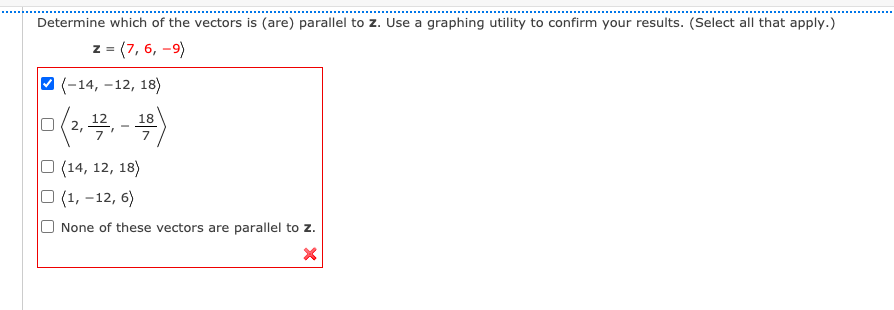Determine which of the vectors is (are) parallel to z. Use a graphing utility to confirm your results. (Select all that apply.) z = (7, 6, –9) (-14, –12, 18) 18 O (14, 12, 18) О (1, -12, 6) | None of these vectors are parallel to z.
Determine which of the vectors is (are) parallel to z. Use a graphing utility to confirm your results. (Select all that apply.) z = (7, 6, –9) (-14, –12, 18) 18 O (14, 12, 18) О (1, -12, 6) | None of these vectors are parallel to z.
Algebra & Trigonometry with Analytic Geometry
13th Edition
ISBN:9781133382119
Author:Swokowski
Publisher:Swokowski
Chapter8: Applications Of Trigonometry
Section8.4: The Dot Product
Problem 13E
Related questions
Question

Transcribed Image Text:Determine which of the vectors is (are) parallel to z. Use a graphing utility to confirm your results. (Select all that apply.)
z =
=(7, 6, –9)
(-14, –12, 18)
12
18
O ( 2,
7
O (14, 12, 18)
(1, -12, 6)
None of these vectors are parallel to z.
Expert Solution
This question has been solved!
Explore an expertly crafted, step-by-step solution for a thorough understanding of key concepts.
This is a popular solution!
Trending now
This is a popular solution!
Step by step
Solved in 2 steps

Recommended textbooks for you

Algebra & Trigonometry with Analytic Geometry
Algebra
ISBN:
9781133382119
Author:
Swokowski
Publisher:
Cengage

Algebra and Trigonometry (MindTap Course List)
Algebra
ISBN:
9781305071742
Author:
James Stewart, Lothar Redlin, Saleem Watson
Publisher:
Cengage Learning

Elementary Linear Algebra (MindTap Course List)
Algebra
ISBN:
9781305658004
Author:
Ron Larson
Publisher:
Cengage Learning

Algebra & Trigonometry with Analytic Geometry
Algebra
ISBN:
9781133382119
Author:
Swokowski
Publisher:
Cengage

Algebra and Trigonometry (MindTap Course List)
Algebra
ISBN:
9781305071742
Author:
James Stewart, Lothar Redlin, Saleem Watson
Publisher:
Cengage Learning

Elementary Linear Algebra (MindTap Course List)
Algebra
ISBN:
9781305658004
Author:
Ron Larson
Publisher:
Cengage Learning